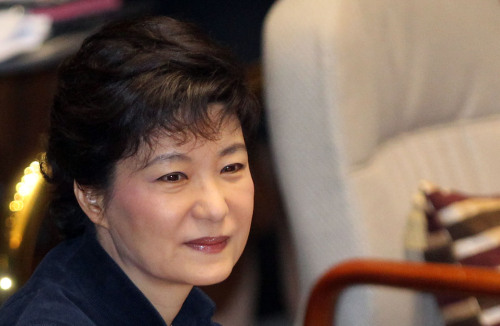Developments may bolster Park Geun-hye ahead of major elections
A major power shift has taken place within the ruling Grand National Party amid calls for reform and concerns over the impact last month’s electoral debacle could have on the general elections slated for April next year.
The shift became clear Friday as Rep. Hwang Woo-yea, seen as a “neutral non-mainstreamer,” was elected party floor leader, beating Rep. An Kyung-ryul, an influential mainstreamer widely expected to win.
In the floor leader election in which 159 of the total 172 GNP lawmakers voted, Hwang garnered 90 votes while An, who represented the largest and most influential faction loyal to President Lee Myung-bak, got only 64.
The outcome indicates that power has shifted from the mainstream faction to what observers say is a “loose yet strategic” alliance of non-mainstreamers led by former GNP chairwoman Park Geun-hye and a group of young lawmakers.
The change could impede the president from pressing ahead with his policies in the almost two remaining years of his term and enhance the influence of his rival Park, who is leading in the polls over other presidential candidates.
An’s defeat came as a surprise as some 30-40 members of the Pro-Lee faction consisting of about 100 lawmakers refused to back him. It was the first defeat for the faction since its victory in the general elections in April 2008.
 |
Park Geun-hye (Yonhap News) |
Hwang apparently received full backing from the faction led by Park, who commands the loyalty of nearly a third of GNP lawmakers, as well as the group of young lawmakers.
Political experts say the young legislators representing districts in Seoul and its surrounding areas decided to support Hwang as they strongly feel the need for leadership change, considering that the mainstream pro-Lee leaders failed to secure a seat for a Bundang constituency in Gyeonggi Province, its traditional stronghold, in last month’s by-elections.
The result of the floor leader vote also showed a clear division of the pro-Lee faction into two groups ― one led by Rep. Lee Sang-deuk, elder brother of the president, and the other by Rep. Lee Jae-oh, special affairs minister who is the stalwart supporter of the president.
The former group sought to ally with the pro-Park faction as they are being cited as one of the “old, mainstream groups” that need to avoid major party activities to rejuvenate and renovate the party, observers said.
The majority of the group, who supported Rep. Lee Byung-suk in the initial round of the floor leader election, switched their votes to Hwang in the second round, joining hands with the pro-Park faction.
The ongoing power shift, experts say, will unequivocally strengthen Park’s position. Attention has been drawn to when she will start full-scale political activities for her bid toward Cheong Wa Dae.
Park, daughter of the late former President Park Chung-hee, has largely kept a low profile on the political scene. Some criticized her for being too cautious in her words and activities ahead of the presidential vote in December next year.
Pro-Park lawmakers said in media interviews that Park may not begin any conspicuous political moves for the time being until the campaign for parliamentary elections in April kicks off late this year or early next.
Some expressed concern that the pro-Park faction was quickly rising into the mainstream and seeking to clinch leadership posts in the party could give an unpalatable impression of a “greedy” faction and cause a public backlash.
In the upcoming leadership contest slated for late June or early July, some political observers predict that an alliance between the pro-Park faction and the group of young lawmakers may seek a fresh young assembly member as party leader. The faction appears reluctant to openly suggest that one of them take the party helm.
The floor leader election apparently affected the president’s reshuffle last Friday, observers said.
The president, who previously tended to pick his close aides and associates for Cabinet posts, appointed five new ministers evaluated as experts in related fields or seasoned bureaucrats.
He reportedly gave up some of his picks, including former ambassador to China Ryu Woo-ik, once considered for the post of unification minister, in the face of strong resistance from the ruling party.
Meanwhile, the GNP on Saturday picked Rep. Chung Ui-hwa as chairman of its 13-member emergency panel to be launched on Monday. The panel will lead the party’s reform efforts for up to 60 days until the new leadership is formed.
The party leadership, including its former leader Ahn Sang-soo, had decided to step down en masse in responsibility for the election failure last month, and run the ad hoc committee.
However, the decision faced objections from some party members on Sunday.
Some party leaders expressed their objection to the idea of resigning in droves, saying they need to check party regulations to find out whether they should follow the leader’s decision to quit.
Some young GNP lawmakers also objected to the immediate formation of the panel, saying that its formation should be approved at a general meeting of GNP lawmakers. This appears to be because the committee could influence the election of party leader to be held in about two months.
During the press conference on Sunday to mark his resignation, Ahn said that President Lee should spend more time and energy communicating with people.
“One thing I feel sad is that there was a lack of communication between people (and the president). I want to ask him to spend more time communicating with and persuading citizens,” An said at the party’s headquarters in Seoul.
By Song Sang-ho (
sshluck@heraldcorp.com)








